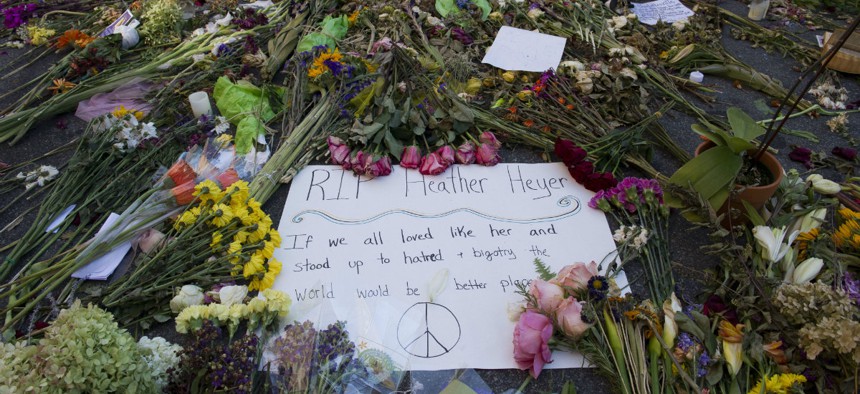Mayors Join With the Anti-Defamation League in Effort to Combat White Supremacy

Notes and flowers form a memorial in Charlottesville, Va., on Friday, Aug. 18, 2017 at the site where Heather Heyer was killed. Heyer was struck by a car while protesting a white nationalist rally on Saturday Aug. 12. (AP Photo/Cliff Owen)

Connecting state and local government leaders
Mayors say Charlottesville was a “clarion call to create stronger cultures of kindness and compassion in all of our communities.”
The U.S. Conference of Mayors and the Anti-Defamation League came together in a conference call with reporters on Friday to announce a partnership and an agreement to combat hate movements in cities and towns across the country.
The move follows public statements made by President Trump who blamed “many sides” for the violence that occurred as part of the white supremacist “Unite the Right” rally in Charlottesville, Virginia that left one dead and dozens injured on Aug. 11.
The mayors who spoke on Friday were united in their interpretation of the events in Charlottesville. Collectively these city leaders viewed the clashes over the weekend as a sign to reaffirm their roles as public servants in countering hate and bias within their localities.
“The violent and hateful event that unfolded in Charlottesville was a clarion call to create stronger cultures of kindness and compassion in all of our communities,” said Columbia, South Carolina Mayor Stephen Benjamin, who is the current vice president of the Conference of Mayors.
As part of that effort, the Conference of Mayors, along with the Anti-Defamation League unveiled a joint initiative called the “Mayors' Compact to Combat Hate, Extremism and Bigotry,” a 10-part strategy that would have city leaders committing to rejecting extremism, white supremacy and all forms of bigotry; supporting targeted communities and ensuring public safety while protecting free speech and other constitutional rights.
Within the first 48 hours, more than 250 mayors had already signed on to the effort. That represents more than half of the total membership of the Conference of Mayors.
Tom Cochran, the CEO and executive director of the Conference of Mayors, estimated that at least a quarter of those signatories identify as Republican.
“This is probably the strongest Republican response that we have in history,” Cochran said when asked about the political makeup of the mayors who had committed to the compact.
When asked on the call what they might do differently if a rally like “Unite the Right” were to come to their cities or towns, the mayors refused to outline specific measures or strategies they might employ, and notably, the compact itself does not take a stand on what localities should do about the Confederate monuments that have been at the center of these events. Mayors on the call instead called for an individual locally-centered approach to each of these issues.
Karen Freeman-Wilson, the mayor of Gary, Indiana, did make one thing clear.
“We all support free speech,” she said. “But we support public safety even more.”
Many of the mayors on Friday’s call also highlighted the special role city leaders can play in this arena and several argued that the literal proximity a city mayor has to their constituents gives them greater power to foster cohesion.
“This isn’t politics for us, it’s the work we do every day,” said Austin Mayor Steve Adler. “Mayors are well-situated to lead on this issue. We can tell the good guys from the bad guys. There are only two sides to racism,” he added, “the right side of history and the wrong side of history.”
The city leaders also addressed their perspectives on the messages coming from the White House.
“In the past week we have seen hatred at its ugliest,” said Shane Bemis, the mayor of Gresham, Oregon. “Mayors can say definitively that our residents know that even if the prominent resident of 1600 Pennsylvania Ave. insists on parsing words and finds himself engulfed in the fog or moral ambiguity.”
Bemis, a Republican, went on to express concerns that the “lack of moral clarity” on the part of Donald Trump “threatens to destroy a storied political institution.”
Bemis wasn’t alone in his assessment of Trump’s response.
“Mayors don’t need a teleprompter to say Nazis are bad,” said Adler.
Quinn Libson is a Staff Correspondent for Government Executive’s Route Fifty.

NEXT STORY: LENSAlert touches residents where they live (literally)





